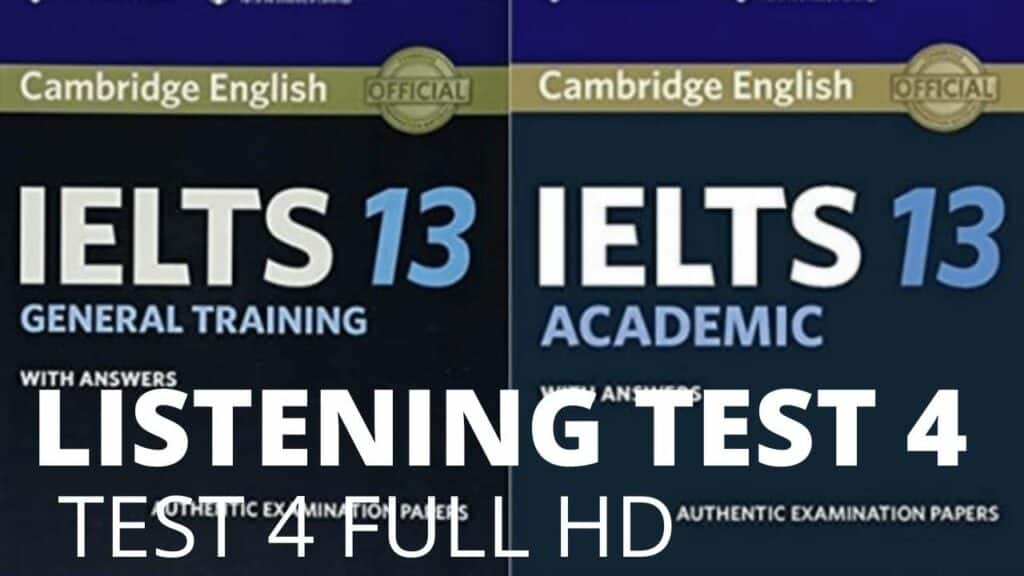Cambridge IELTS 13 Listening Test 4
The Cambridge IELTS 13 Listening Test 4 offers an engaging mix of topics to enhance your IELTS Listening skills. This test features “Alex’s Training”, discussing a training program and its requirements; “The Snow Centre”, highlighting winter sports activities and services; “Labels giving nutritional information food packaging”, exploring the importance of food labeling; and “The history of coffee”, a fascinating journey into coffee’s origins and global impact.
Each section helps test-takers practice essential listening skills, including understanding details, speaker intentions, and complex ideas. Answers are provided to guide your preparation effectively.
Cambridge IELTS 13 Listening Test 4 Audio Recording
Cambridge IELTS 13 Listening Test 4 – Section 1
Section 1:
Questions 1-10
Complete the notes below. Write ONE WORD OR A NUMBER.
Alex’s Training
Example
Alex completed his training in 2014
About the applicant:
• At first Alex did his training in the (1)_______ department
• Alex did not have a qualification from school in (2)_______
• Alex thinks he should have done the diploma in (3)_______ skills
• Age of other trainees: the youngest was (4)_______
Benefits of doing training at JPNW:
• Lots of opportunities because of the size of the organization
• Trainees receive the same amount of (5)_______ as permanent staff
• The training experience increases people’s confidence a lot
• Trainees go to (6)_______ one day per month
• The company is in a convenient (7)_______
Advice for interview:
• Do not wear (8)_______
• Do not be (9)_______
• Make sure you (10)_______
Cambridge IELTS 13 Listening Test 4 – Section 2
Section 2:
Questions 11-16
Choose the correct letter A, B or C.
The Snow Centre
11. Annie recommends that when cross-country skiing, the visitors should
A get away from the regular trails.
B stop to enjoy views of the scenery.
C go at a slow speed at the beginning.
12. What does Annie tell the group about this afternoon’s dog-sled trip?
A Those who want to can take part in a race.
B Anyone has the chance to drive a team of dogs.
C One group member will be chosen to lead the trail.
13. What does Annie say about the team relay event?
A All participants receive a medal.
B The course is 4 km long.
C Each team is led by a teacher.
14. On the snow-shoe trip, the visitors will
A visit an old gold mine.
B learn about unusual flowers.
C climb to the top of a mountain.
15. The cost of accommodation in the mountain hut includes
A a supply of drinking water.
B transport of visitors’ luggage.
C cooked meals.
16. If there is a storm while the visitors are in the hut, they should
A contact the bus driver.
B wait until the weather improves.
C use the emergency locator beacon.
Questions 17-20
What information does Annie give about skiing on each of the following mountain trails?
Choose FOUR answers from the options below and write the correct letter A-F next to questions 17-20
Information
A it has a good place to stop and rest
B it is suitable for all abilities
C it involves crossing a river
D it demands a lot of skill
E it may be closed in bad weather
F it has some very narrow sections
Mountain trails
17. Highland trail
18. Pine trail
19. Stony trail
20. Loser’s trail
Cambridge IELTS 13 Listening Test 4 – Section 3
Section 3:
Questions 21-26
Choose the correct letter A, B or C.
Labels giving nutritional information on food packaging
21. What was Jack’s attitude to nutritional food labels before this project?
A He didn’t read everything on them.
B He didn’t think they were important.
C He thought they were too complicated.
22. Alice says that before doing this project.
A she was unaware of what certain foods contained.
B she was too lazy to read food labels.
C she was only interested in the number of calories.
23. When discussing supermarket brands of pizza, Jack agrees with Alice that
A the list of ingredients is shocking.
B he will hesitate before buying pizza again.
C the nutritional label is misleading.
24. Jack prefers the daily value system to other labelling systems because it is
A more accessible.
B more logical.
C more comprehensive.
25. What surprised both students about one flavour of crisps?
A The percentage of artificial additives given was incorrect.
B The products did not contain any meat.
C The labels did not list all the ingredients.
26. What do the students think about research into the impact of nutritional food labelling?
A It did not produce clear results.
B It focused on the wrong people.
C It made unrealistic recommendations
Questions 27 and 28
Choose TWO letters A-E.
Which TWO things surprised the students about the traffic-light system for nutritional labels?
A its widespread use
B the fact that it is voluntary for supermarkets
C how little research was done before its introduction
D its unpopularity with food manufacturers
E the way that certain colours are used
Questions 29 and 30
Choose TWO letters, A-E
Which TWO things are true about the participants in the study on the traffic-light system?
A They had low literacy levels.
B They were regular consumers of packaged food.
C They were selected randomly.
D They were from all socio-economic groups.
E They were interviewed face-to-face.
Cambridge IELTS 13 Listening Test 4 – Section 4
Section 4:
Questions 31-40
Complete the notes below. Write ONE WORD ONLY for each answer.
The History of Coffee
Coffee in the Arab world
• There was small-scale trade in wild coffee from Ethiopia.
• 1522: Coffee was approved in the Ottoman court as a type of medicine.
• 1623: In Constantinople, the ruler ordered the (31)_______ of every coffee house.
Coffee arrives in Europe (17th century)
• Coffee shops were compared to (32)_______
• They played an important part in social and (33)_______ changes.
Coffee and European colonisation
• European powers established coffee plantations in their colonies
• Types of coffee were often named according to the (34)_______ they came from.
• In Brazil and the Caribbean, most cultivation depended on (35)_______
• In Java, coffee was used as a form of (36)_______
• Coffee became almost as important as (37)_______
• The move towards the consumption of (38)_______ in Britain did not also take place in the USA.
Coffee in the 19th century
• Prices dropped because of improvements in (39)_______
• Industrial workers found coffee helped them to work at (40)_______
Cambridge IELTS 13 Listening Test 4 Answers
Practice with Expert IELTS Tutors Online
Apply Code "IELTSXPRESS20" To Get 20% off on IELTS Mock Test
Alex’s Training Listening Answers
1. finance
2. maths
3. business
4. 17
5. holidays/ vacations
6. college
7. location
8. jeans
9. late
10. smile
The Snow Centre Listening Answers
11. A
12. B
13. A
14. C
15. A
16. B
17. B
18. D
19. A
20. E
Labels giving nutritional information food packaging Listening Answers
21. A
22. A
23. C
24. C
25. B
26. A
27. B
28. C
29. D
30. E
The history of coffee Listening Answers
31. destruction
32. university
33. political
34. port(s)
35. slaves/ slavery
36. taxation
37. sugar
38. tea
39. transportation
40. night
Also Check: 1000+ Most Common Words for IELTS
Also Practice : Practice Cambridge IELTS 15 Listening Test 1 with Answers



